Items
Tag is exactly
family
-
 2020-09-16
2020-09-16Jewish Melbourne
Reflection and Resilience -
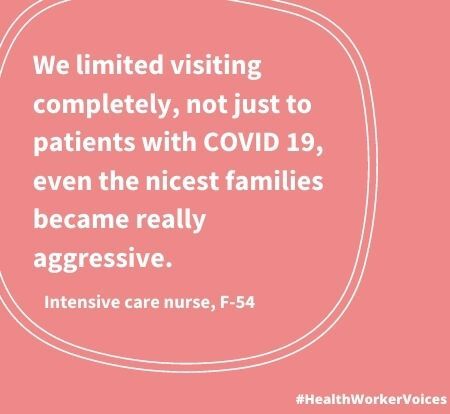 2020-07-07
2020-07-07Australian Health Worker quote on reactions from patients' families
We limited visiting completely, not just to patients with COVID 19, even the nicest families became really aggressive. Quote from Female aged 54, Intensive Care Nurse. Image created by the Health Worker Voices project: https://mspgh.unimelb.edu.au/healthworkervoices -
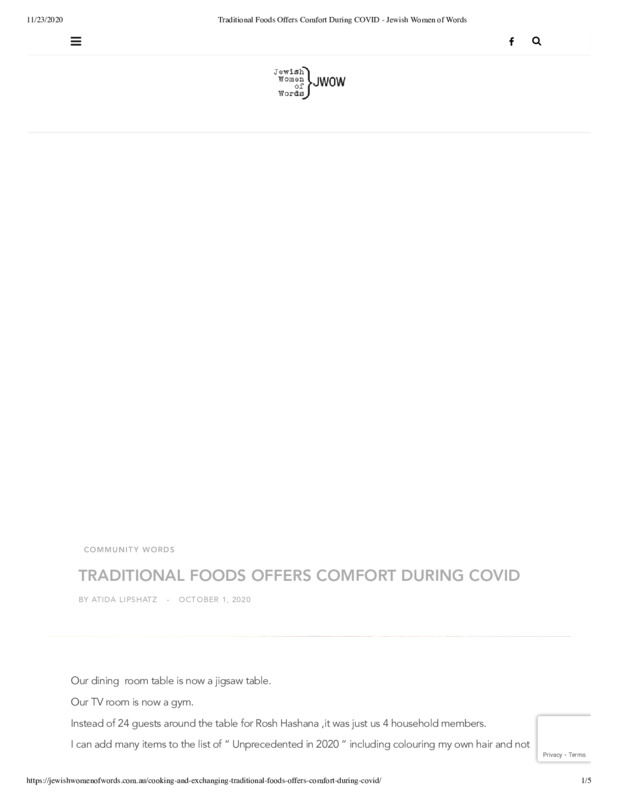 2020-10-01
2020-10-01Jewish Melbourne: Jewish Women of Words - Atida Lipshatz
Atida Lipshatz wrote a piece for Jewish Women of Words reflecting on food during the pandemic -
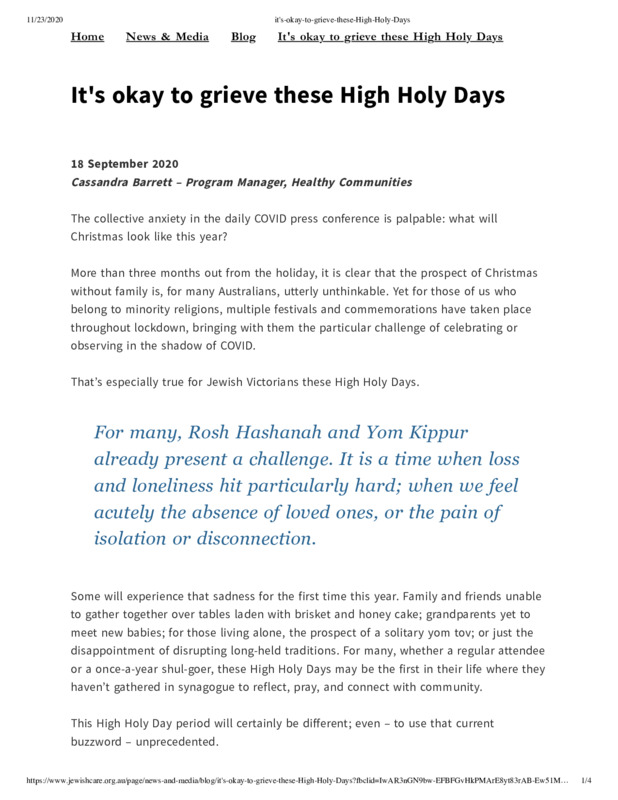 2020-09-18
2020-09-18Jewish Melbourne: Jewish Care writing from staff about celebrating the HHD in lockdown
This is a blog post by Cassandra Barrett, the Program Manager, Healthy Communities, about getting through the High Holy Days while separated from family. -
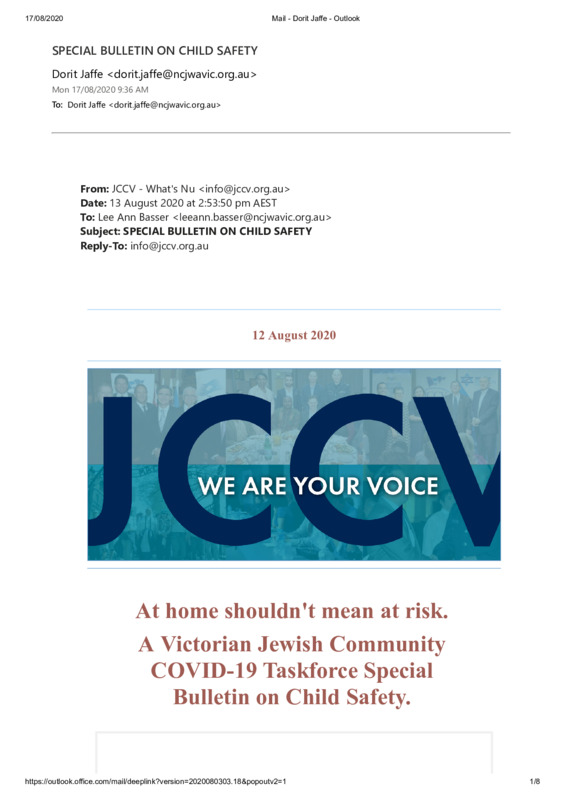 2020-08-17
2020-08-17Jewish Melbourne: NCJWA (Vic) Covid taskforce response on child safety
Information provided by NCJWA (Vic) to provide advise to community members on ensuring child safety during pandemic times. -
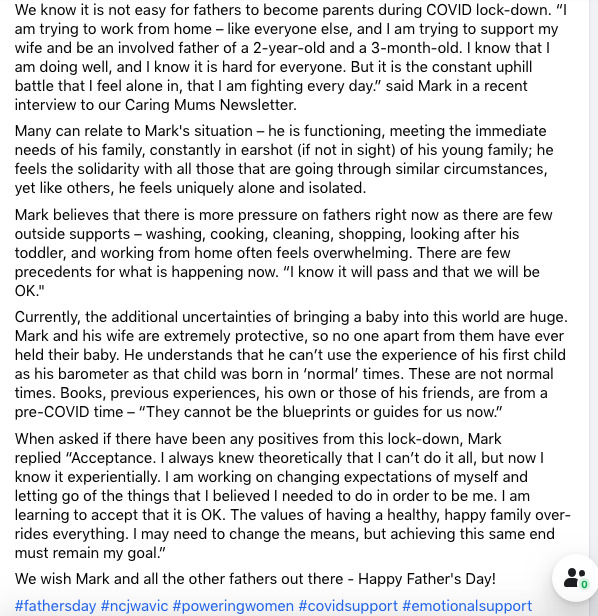 2020-09-06
2020-09-06Jewish Melbourne: NCJWA (Vic) Fathers Day during Covid Facebook post
The NCJWA (Vic) posted on facebook for Fathers Day, reflecting on how fathers have coped during lockdown. -
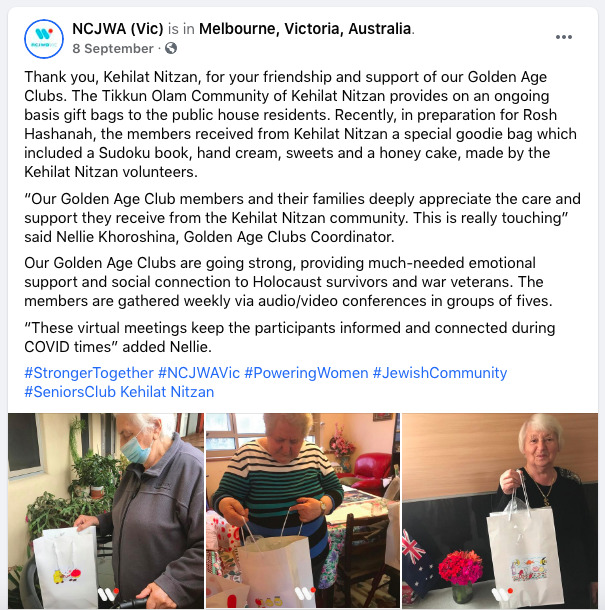 2020-09-08
2020-09-08Jewish Melbourne: NCJWA (Vic) Golden Age club activities
"Thank you, Kehilat Nitzan, for your friendship and support of our Golden Age Clubs. The Tikkun Olam Community of Kehilat Nitzan provides on an ongoing basis gift bags to the public house residents. Recently, in preparation for Rosh Hashanah, the members received from Kehilat Nitzan a special goodie bag which included a Sudoku book, hand cream, sweets and a honey cake, made by the Kehilat Nitzan volunteers. “Our Golden Age Club members and their families deeply appreciate the care and support they receive from the Kehilat Nitzan community. This is really touching” said Nellie Khoroshina, Golden Age Clubs Coordinator. Our Golden Age Clubs are going strong, providing much-needed emotional support and social connection to Holocaust survivors and war veterans. The members are gathered weekly via audio/video conferences in groups of fives. “These virtual meetings keep the participants informed and connected during COVID times” added Nellie." -
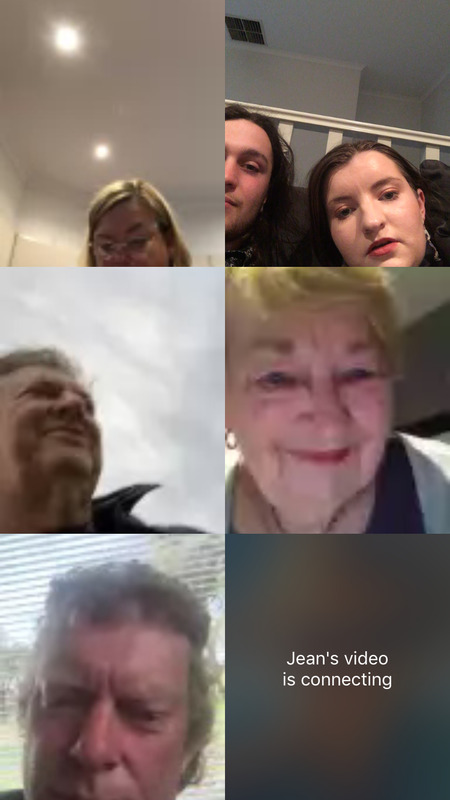 2020-04
2020-04Family facetime
At the start of lockdown it became clear that my family would not be able to see each other for a while. Most of my family lives in Sydney, some of us live in Melbourne, regional Victoria and Canada. In response, my sister initiated a Coffey Family FaceTime every night at 6:30pm with whoever was available. However, this meant teaching my grandmothers how to use Facebook and how to start a call. More than 8 months later and both my grandmothers still can’t turn their video on without direction and also can’t start Facebook calls. This call kept us together when we felt far away. Celebrating father’s day and birthdays and anniversaries on FaceTime made some moments more memorable and some feel more lonely. Face timing each other was fun until there was a family dinner in Sydney and you couldn’t leave the state. However, there were fun moments, stirring up my parents dogs by yelling “walkies” or “dindins” and then leaving the call, FaceTiming on empty trams and using the weird face effects to confuse my grandmother about who’s camera was whose. The call gave structure to the days spent inside and caused me to talk to my grandmothers and extended family more about the current world events. HIST30060 -
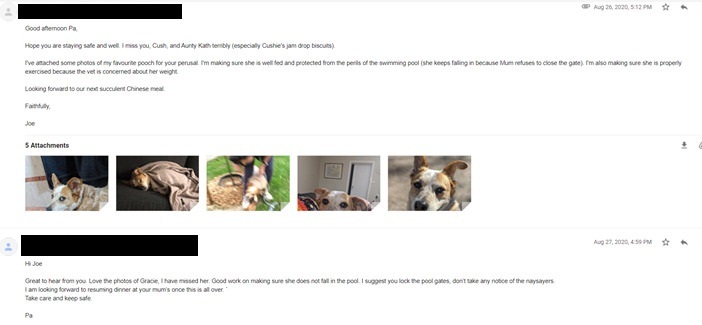 2020-08-26
2020-08-26Grandpa & Gracie
I’ve missed my Grandpa terribly, but we’ve able to bond during the pandemic through a continuous email exchange concerning my dog. I’ll send him photos, and he’ll help me conspire ways to keep her safe from falling in our pool. We’ve been able to connect through our shared love of Gracie, even though we haven’t seen him or my Grandma for months. It’s been one of the most fulfilling experiences I’ve had in this plague year, especially because Grandpa is mostly deaf and can’t communicate well in person. It’s interesting how technology (and Gracie!) have facilitated connection between us. For a nonagenarian, he’s probably more proficient with technology than I am! -
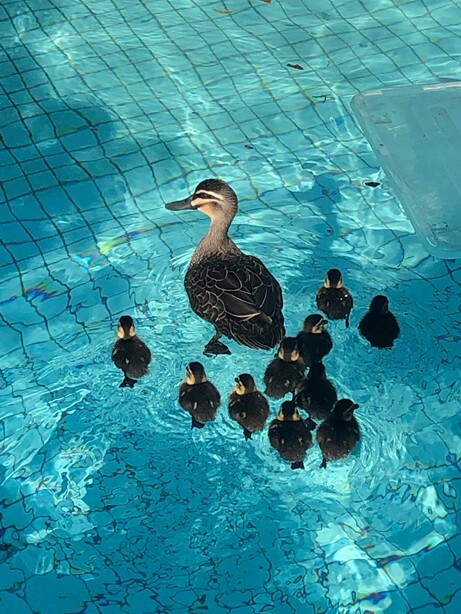 2020-07-10
2020-07-10New Arrivals
HIST30060 Perhaps the most unexpected event in 2020 (bushfires and pandemic aside) for my family was the arrival of a proud mother duck with ten tiny ducklings. They’ve declared dominion over our pool and taken up permanent residence. I think it’s been cathartic for everyone to watch them grow and spread their wings – literally! The ducklings are just one of a number of new arrivals. We’ve also had currawongs, cockatoos, pigeons, doves, magpies and butcherbirds. They come and chill in the backyard, and mum makes sure they’re appropriately fed and watered. We think that we’ve had so many newcomers to our menagerie because of the bushfires at the start of the year, which destroyed a lot of natural habitat. But we also think the pandemic has played a role: with so many people spending all their exercise/recreational time in parks and nature reserves, disturbed birds have fled for greener pastures. I think it’s important to divorce ourselves from our own experiences of the plague year and consider how the pandemic has affected the natural world around us. We’re not alone in confronting change, and it would be selfish to only consider human experiences. -
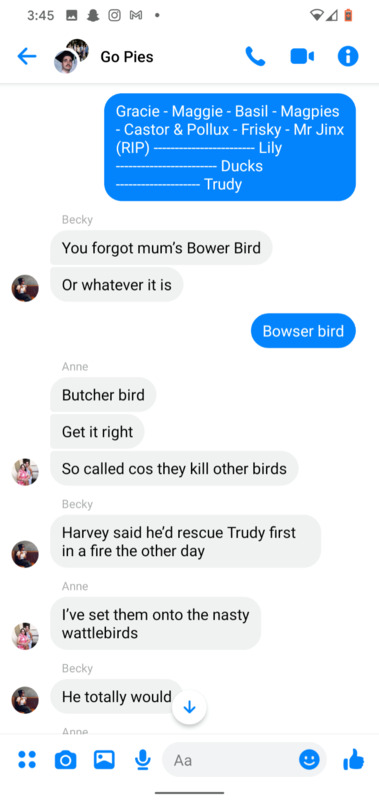 2020-09-26
2020-09-26Family Fights
HIST30060 My family is pretty large: I have two brothers, a sister….and a whole menagerie of animals! Gracie dog is the best, but we also have another dog, several cats, a rabbit, and a variety of feathered friends. My siblings live interstate, so we’ve been barred from seeing them since February because of border restrictions. During lockdown, we’ve been keeping in touch by having consistent arguments on our family group chat about how to rank our pets from best to worst. My brother frames it like a ‘best and fairest medal’, as you’d receive in sport. The conversations remind me of when we all used to live together at home, and they’ve provided a nice reprieve from more ominous discussions about the pandemonium enveloping society. I think the notion of ‘reprieve’ is central to the power of animals in this plague year: they distract us from our pandemic woes and force us to take a sabbatical from our anxieties. -
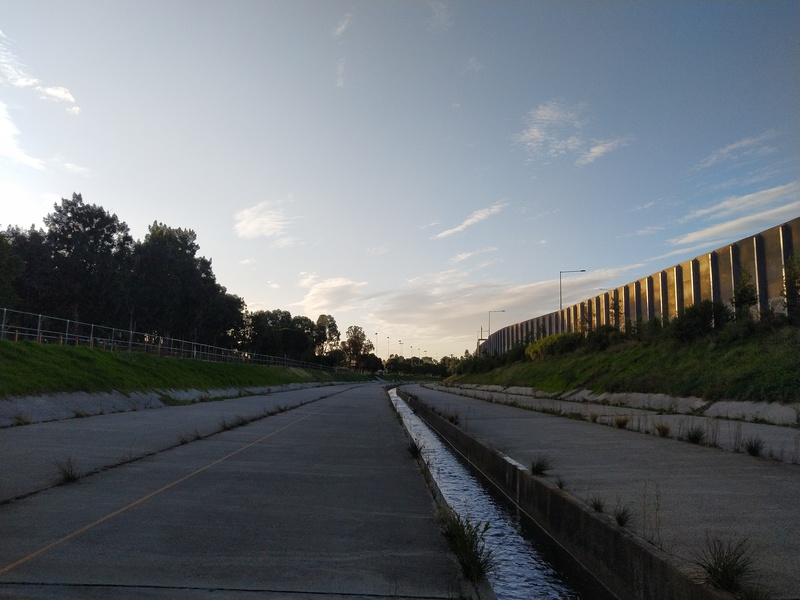 2020-07-05
2020-07-05The Life-Giving Locale
This is the Moonee Ponds Drain. Concrete behemouth. Primary function: transport storm water to the Bay via the Maribyrnong River. Secondary functions (that came to light under lockdown): bike path, rollerblading circuit, mushroom foraging field, freeway viewing platform, late night extension of the lounge room during household parties, study break spot, skate park, graffiti canvas, shortcut to nearby suburbs, and shopping cart disposal pit. This place truly brings the community together. HIST 30060 -
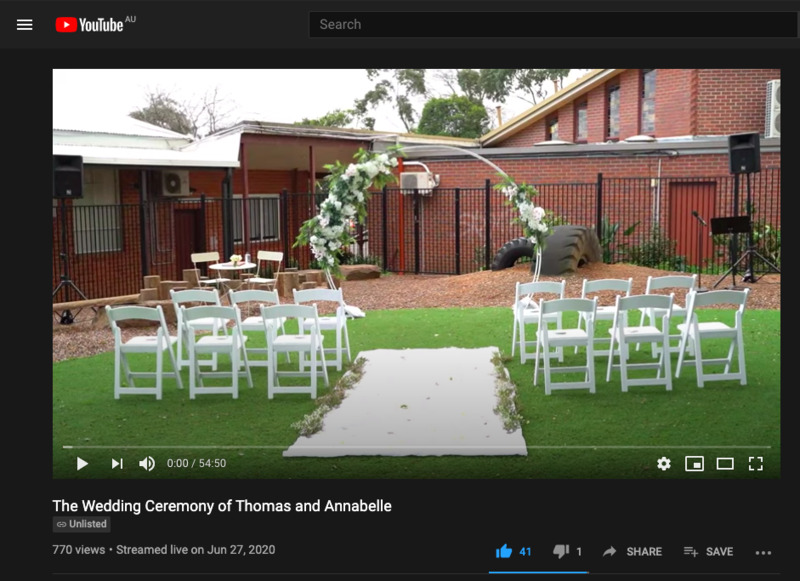 2020-06-27
2020-06-27We Got Married During a Pandemic
HIST30060: Making History My husband I planned our wedding for November 2020. My extended family lives in Malaysia, and we had organized for them to fly over to Melbourne for the celebrations, inclusive of classic wedding dancing, food and merriment. It obviously did not happen like that – but, it was better. In March, when the restrictions hit Victoria, we decided to move our wedding to June, not even knowing how many guests we would be able to have at that point. A few of our friends eloped, and some even planned a wedding in one night to accommodate the changing restrictions. In the weeks leading up, we pulled together our 20-person guest list, hired a photographer, and on the 27th June 2020, got married in intimate courtyard of our parents’ church. There was no (intense) dancing or fancy decorations, instead we got to focus on each other, on vows we made to each other under God and before our closest family and friends, and we got to live-stream our ceremony to everyone else (big win to not offending anyone). We are so thankful to God – it is better than we could have imagined or planned for ourselves. -
2020-11-09
HIST30060
1. The Trump family contracting Covid When my friend first texted me about Donald and Melania Trump contracting Covid-19, I let out a hysterical laugh. To me, it wasn’t Trump, the person, contracting the virus that was funny but rather Trump, the one who belittled the effects of the virus and avoided taking meaningful measures to minimise its impact, that was funny. It was a stark reminder that boundaries between the powerful and the powerless, between the wealthy and the disadvantaged, between the authorities and the ones subject to authority, between varying socioeconomic standings can be blurred, especially in the case of a global pandemic. While pandemics have an undeniable impact on the disadvantaged or those with lower socioeconomic means, its impact on a figure such as Trump somewhat demonstrated that no one is beyond a virus. 2. Stigmatising Migrant Communities in Victoria When the second outbreak unfolded in Victoria, it was really interesting to, firstly, see the socioeconomic inequalities come into light and, secondly, the Victorian migrant communities framed as the problem. They were projected to be the cause of the second outbreak in Victoria which prompted the media to monopolise on this racist and bigoted rhetoric of migrants causing trouble. The media and some members of the public (through social media) insinuated that migrant communities’ culture was, by default, antithetical to the Australian way of life and thrust Victoria into another lockdown. It later became clear that the Victorian government’s hotel quarantine disaster prompted a second outbreak. The security personnel and other staff employed by the Victorian government spread the virus to a handful of postcodes in Victoria. The areas where the outbreaks first began to emerge were areas with lower socioeconomic standing and migrant communities. Considering that these staff members were from these postcodes, the outbreak seemed to be prompted and furthered by the migrant culture which supposedly allowed for the flouting of restrictions, mass gatherings and, therefore, quick local transmission of the virus. The wealthier suburbs or postcodes weren’t hit as hard. Thus, demonstrating the existing socioeconomic inequalities in Victoria and the way in which some communities were hit harder than others. It was striking to see how easily a community can be framed and dismissed as the other and the troublemaker. Additionally, this may speak to the debates or concerns which are left outside the national discussion which, in turn, can contribute to a specific historical record based on the dominant narrative. In Victoria’s case, perhaps this can be the more general covid lockdown narrative which for the average Victorian is divorced from any ethnic implications whilst for other Victorians, the connotations associated with their ethnic identities, particularly in the context of the covid pandemic, is warped and bigoted. 3. Burqa vs. facemask hypocrisy – facemasks can become the normalcy but burqa’s never will With the introduction of the coronavirus restrictions around the world, it was interesting to see the discourse around face-covering change, particularly, in the West. For about two decades, following 9/11 in America, there has been negative messaging around the burqa some Muslim women choose to wear. It was deemed socially unacceptable and antithetical to societal norms or appropriateness. Muslim women have been subjected to vilification and have been told that the burqa limits communication and is a symbol of an anti-western patriarchal tradition. There seems to be a hypocrisy around this issue in that while a health concern can normalise a face covering, religious reasoning seems insufficient. While the historical baggage associated with the burqa far surpasses this debate of covering versus revealing the face and, of course, while the health benefits of a face mask is of great importance, there is room to view it with a somewhat binary approach. Put more plainly, it seems while the health implications of any form of face covering or clothing items can allow officials to impose policies around mandatory face covering, religion or, more importantly, freedom of choice, does not offer enough of an incentive for officials to consider burqas as societally and socially acceptable. I believe the policies begat from health concerns are of prime importance. However, these policies can coexist alongside policies of acceptance. Thus, the reframing of societal norms to accommodate for another’s interpretation of their religious obligations. 4. Family member in hospital during Covid With the Covid pandemic, 2020 is probably one of the worst years to approach a hospital in any way. My family and I were unfortunate to have experienced a situation (not Covid-19 related) which required us to rush a family member to the hospital. I found that it was one of the hardest things I have had to cope with throughout my life. This is a photo of my family member’s patient wristband. As nurses in the emergency were asking one another about whether the incoming patients were swabbed for covid, the added difficulties of this situation were clear. The limited contact I was able to have with my family member due to the hyper alert covid environment at the hospital deeply frustrated me. These were perhaps the organic happenings of life, however, not having the option of being beside my family member and only seeing my family member for 2 hours in a day was tormenting. It was also a reminder of how varied the experiences of the lockdown and restrictions could be. Alongside the general difficulties of the pandemic and the lockdown, there could be added layers of complexity which may range from living arrangements, work, race, socioeconomic status to, in our case, an unexpected health condition. 5. TikTok dance Similar to the millions of others out there during the lockdown, I had my fair share of busting some dance moves on TikTok with my house mate. This made me appreciate the little fleeting moments of happiness even in a very grim-looking world with the virus ravaging communities across the globe. Making this video, learning the dance moves and continuously getting the moves wrong was the most upbeat, thrilling and enjoyable fun I had during quarantine. Also, given that I thought I would never use TikTok, I somewhat understood the solace most of its users found in the app, especially, more than ever, during a global pandemic. -
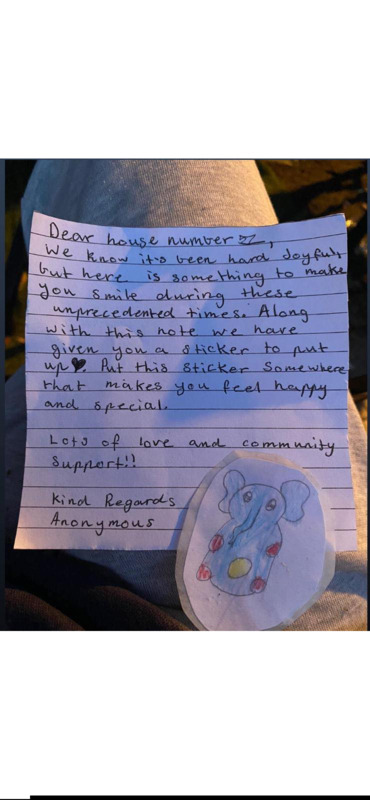 2020-11-05
2020-11-05Lethargic Lockdown
HIST30060 - In reviewing this 'plague' year, I feel that there can be no simple way of explaining the whirlwind of emotions that seemed to fluctuate just as readily and sporadically as our daily covid- case numbers did back in April and May. My first uploaded image is a photograph I took of a note that was found in our letterbox in Balwyn, which we received on the 7th of April. Later we discovered it was made by two younger girls who lived at the bottom of our street, who had been writing similar letters for all our neighbours too! I felt it was very important in this unprecedented time to cherish the small acts of kindness, particularly given the emotional state of lockdown. Despite their relative insignificance, it is these small communal acts which I will cherish, which keep us connected to those around us, while ironically social distancing at the same time. Similarly, the young sisters who made the card are the same age as my niece, 9 years old. I often look at this card and think of how their youth has been irrevocably changed in this pandemic. My second image is a photo I took of Mills beach in Mornington on the 31st of July. I think it will always remind me of the occasion where I snuck down to the Beach, on the premise of doing some 'maintenance' at a family property, which was what I explained to the police who were patrolling the highway. My father has had his bouts with pneumonia in the past, so the family decided that if he could conduct his work from home, then it would be best to get of Melbourne. So my mum and dad were staying down the in Mornington from late March and came back to Melbourne around the start of November. Although we would routinely call eachother on zoom, this photo in a way commemorates the time where I had to sneak down to the beach in order to see them. Though a beautiful sunset at mills beach, there also is a sense of morbid beauty and unease to the photo. It was the only time I think I have ever seen such beautiful weather and calm water, with no boats or people in sight. The third image is a screenshot from a facebook invitation to a party which was created in early March. The guys that made the group event had originally planned to host a get together by December. I think in a sense this does give some explanation in regards to the expectations of corona, and the hysteria that was surrounding it in early March. I think as explained in the screenshot, although we didn't know what to expect, all we did know was that "the next few months are gonna be very long." Recently they updated the invitation from a party that will maybe happen in March next year. Although it may be some form of normality to look forward to, I think that this year more than any other we have learnt to prepare for the worst. Though it is currently listed to go ahead around March next year, part of me thinks it will be delayed again. My fourth image is a screenshot I took from an instagram page called "melb_lockdown," which was created in early April this year. It is an instagram page that features many artful collections of the Melbourne CBD area in black and white photographs. As one who often indulges in photography myself, I think the artist behind the instagram page is always trying to send a message with his work. I think what strikes me most is naturally seeing images of one of the 'most liveable' cities in the world, which is now devoid of the very things that have have given the city it's -claim-to-fame.' The once frenetic energy and vibrancy of the busy Melbourne CBD is now lifeless, colourless, and painfully mundane. My last image, is a meme that a friend of mine sent me. Similarly it is a an Instagram page called 'Covid 19 Funny Memes.' Though very funny, it also highlights a lot of the communal attitudes that have fluctuated and changed through out the pandemic. In late February/ early March, I believe that because it the pandemic was largely still a distant story that was affecting Europe more readily and Australia, it was something we really engaged in a kind of hysteria with. Because we hadn't experienced it, it was something we couldn't truly understand. Certainly these sought of humorous memes were not being created back then. But now I feel having lived with the pandemic for the last 8-9 months, people's attitudes have altered so much. I think because we are now more prepared to satirise, mock or create humorous memes is not to suggest that we have become apathetic towards the pandemic, but I think it shows that we are 'over it.' I think now living with this shadow over our lives for 8 months has taken its toll, and humour may be one way we can attempt to disassociate ourselves from this monotonous cycle. -
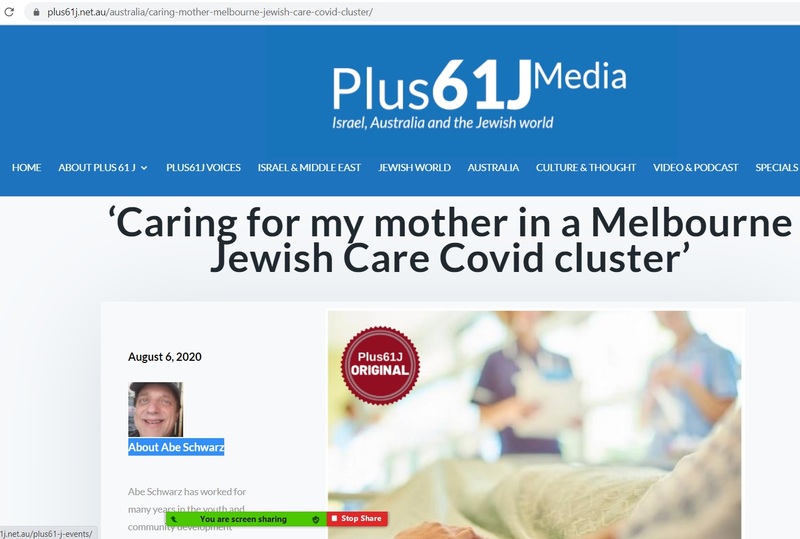 2020-08-06
2020-08-06Jewish Melbourne: ‘Caring for my mother in a Melbourne Jewish Care Covid cluster’
This is an article written by Abe Schwarz and published in +61J Media in which Abe writes about the experience of his mother being in "Monte", the Jewish Care home in St Kilda rd, and their experience of the lockdowns during Covid times. -
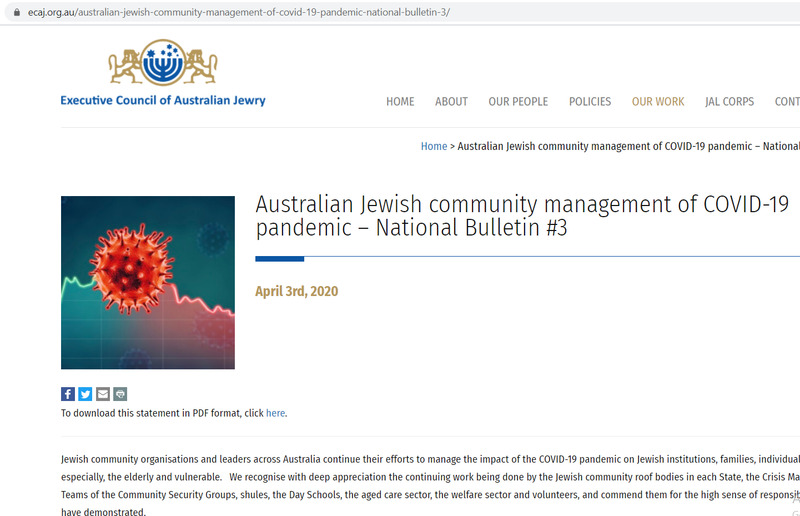 2020-04-03
2020-04-03Jewish Melbourne: Australian Jewish community management of COVID-19 pandemic – National Bulletin #3
In the lead-up to Pesach, this update provides a summary of "the current status of Jewish community life in each State and Territory". It begins: "Jewish community organisations and leaders across Australia continue their efforts to manage the impact of the COVID-19 pandemic on Jewish institutions, families, individuals and, most especially, the elderly and vulnerable. We recognise with deep appreciation the continuing work being done by the Jewish community roof bodies in each State, the Crisis Management Teams of the Community Security Groups, shules, the Day Schools, the aged care sector, the welfare sector and volunteers, and commend them for the high sense of responsibility they have demonstrated. With the approach of Pesach, when families typically gather to celebrate the Seder, many individuals and families will be feeling the effects of physical isolation from relatives and friends. Perhaps in the future we will look back upon these times and appreciate all the more the joy of being able to celebrate Pesach with family and friends, and have all the more compassion for those who have nowhere to go on Seder night, and are all alone." -
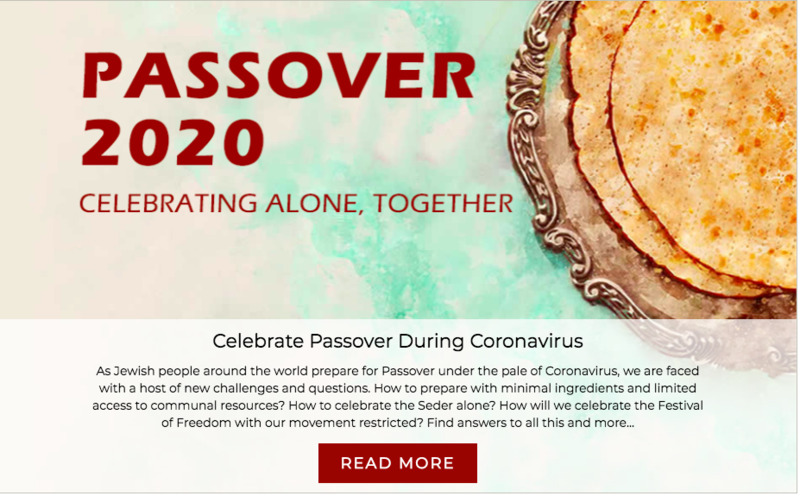 2020-04
2020-04Jewish Melbourne: Chabad Kingston resources for Pesach
L'Chaim Chabad Kingston assembled a website of resources for Pesach 2020, providing information for congregants: "As Jewish people around the world prepare for Passover under the pale of coronavirus, we are faced with a host of new challenges and questions. How are we to prepare with minimal ingredients and limited access to communal resources? How to celebrate the Seder alone? How will we celebrate the Festival of Freedom with our movement restricted? Find answers to all this and more ..." -
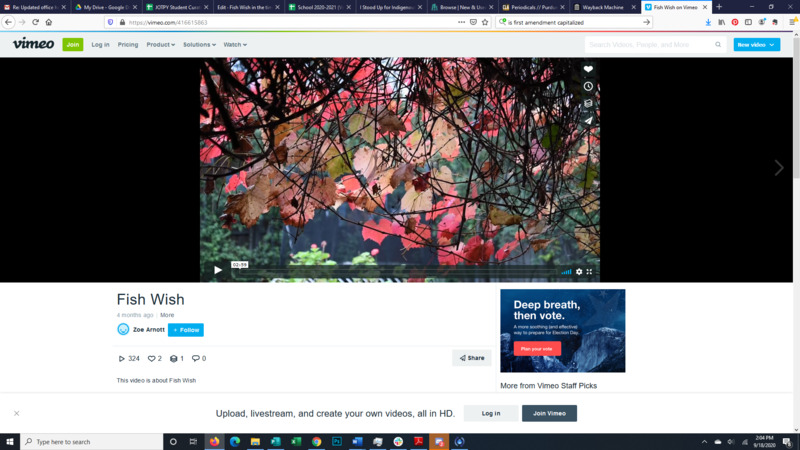 2020-05-04
2020-05-04Fish Wish in the time of Covid - Jewish Melbourne
We decided as a family to create a film that documented our experience of lockdown. The film is a narrative that is loosely based on our family's lived experience in the time of Covid-19. The act of making the film as a family served to connect us creatively. The film also acts as a time capsule. -
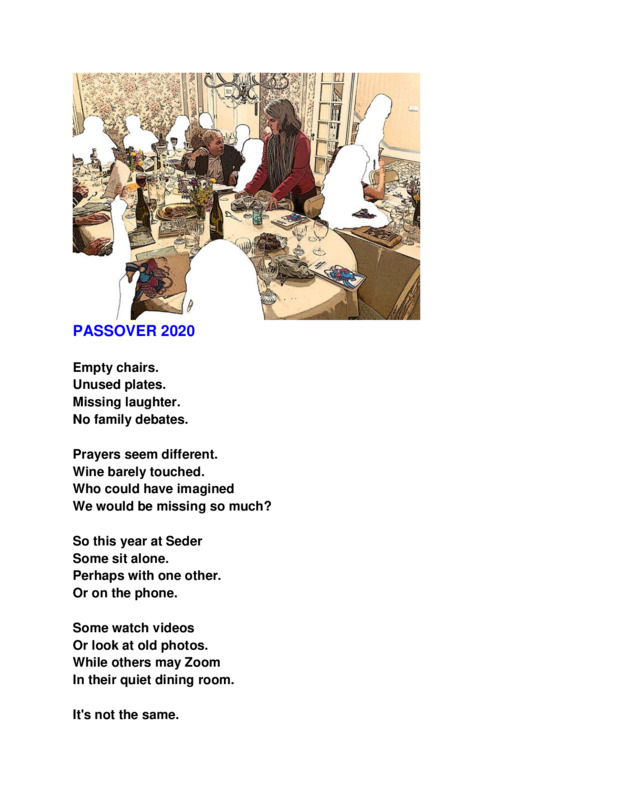 2020-04-07
2020-04-07Jewish Melbourne Passover 2020
Missing the Seder with friends...the story, songs, prayers, food and children squirming waiting for dinner. -
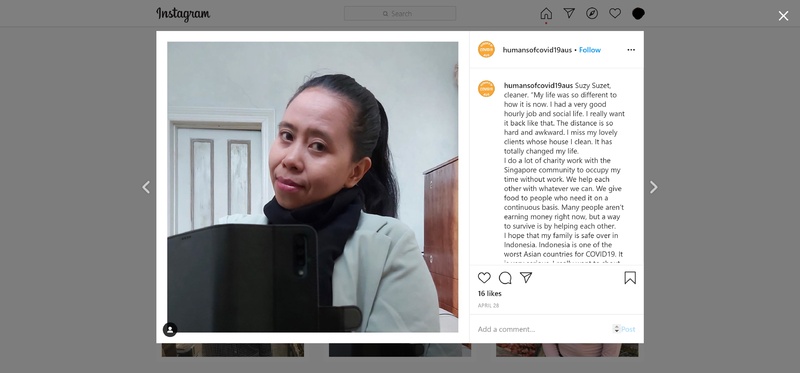 2020-04-28
2020-04-28Humans of Covid-19 AU: Suzy Suzet
“My life was so different to how it is now. I had a very good hourly job and social life. I really want it back like that. The distance is so hard and awkward. I miss my lovely clients whose house I clean. It has totally changed my life. I do a lot of charity work with the Singapore community to occupy my time without work. We help each other with whatever we can. We give food to people who need it on a continuous basis. Many people aren’t earning money right now, but a way to survive is by helping each other. I hope that my family is safe over in Indonesia. Indonesia is one of the worst Asian countries for COVID19. It is very serious. I really want to shout out to my people “this is the worst thing and listen to the government’s warnings!”. I always remind my family: stay at home. Don't worry about food or money, I will provide. Just don’t step outside the house. I really appreciate the Australian Government, they are doing the best. The cases have slowed down, and there has been a good response and togetherness from all of the people. We must always be aware of what the government is saying. Always listen and do it, it’s not that hard. This is not a holiday, lock down is lock down. I have to go outside to make money. The rest are very lucky to work from home.” Instagram post on Suzy Suzet, cleaner, and her experience during the pandemic, which was created by a psychology student living in Melbourne who was interested to hear about how COVID-19 was impacting on different peoples’ lives. -
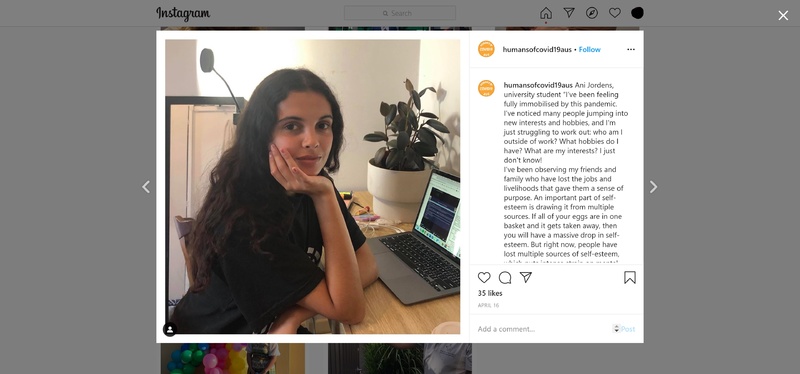 2020-04-16
2020-04-16Humans of Covid-19 AU: Ani Jordens
“I’ve been feeling fully immobilized by this pandemic. I’ve noticed many people jumping into new interests and hobbies, and I'm just struggling to work out: who am I outside of work? What hobbies do I have? What are my interests? I just don't know! I’ve been observing my friends and family who have lost the jobs and livelihoods that gave them a sense of purpose. An important part of self-esteem is drawing it from multiple sources. If all of your eggs are in one basket and it gets taken away, then you will have a massive drop in self-esteem. But right now, people have lost multiple sources of self-esteem, which puts intense strain on mental health. Perhaps we need new structures and more supportive systems. The working-at-home thing has revolutionized able-bodied peoples’ lives, and could be used in a really productive way post-pandemic to make careers more accessible to people with a disability. Hopefully we learn something from this.” Instagram post on Ani Jordens, a university student, and her experience during the pandemic, which was created by a psychology student living in Melbourne who was interested to hear about how COVID-19 was impacting on different peoples’ lives. -
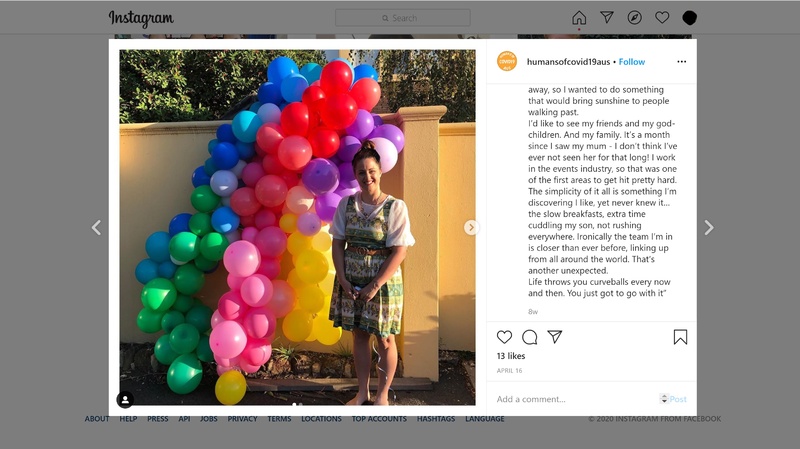 2020-04-16
2020-04-16Humans of Covid-19 AU: Nicole
“Like everyone else, I was feeling a bit gloomy and today is actually the anniversary of my brother passing away, so I wanted to do something that would bring sunshine to people walking past. I’d like to see my friends and my god-children. And my family. It’s a month since I saw my mum - I don’t think I’ve ever not seen her for that long! I work in the events industry, so that was one of the first areas to get hit pretty hard. The simplicity of it all is something I’m discovering I like, yet never knew it… the slow breakfasts, extra time cuddling my son, not rushing everywhere. Ironically the team I’m in is closer than ever before, linking up from all around the world. That’s another unexpected. Life throws you curveballs every now and then. You just got to go with it” Instagram post on Nicole, events, and her experience during the pandemic, which was created by a psychology student living in Melbourne who was interested to hear about how COVID-19 was impacting on different peoples’ lives. -
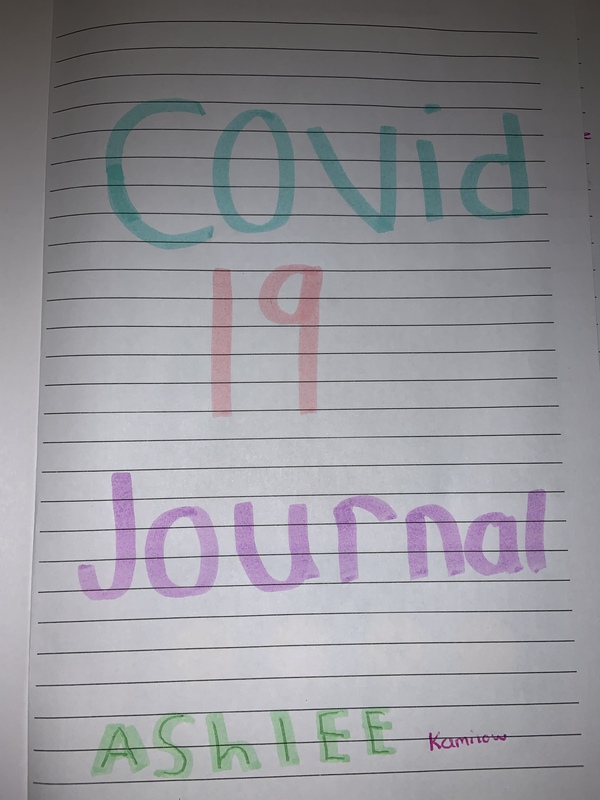 2020
2020COVID 19 journal
This is a journal I wrote my self for a school assignment to recount what it was like living through the COVID 19 crisis -
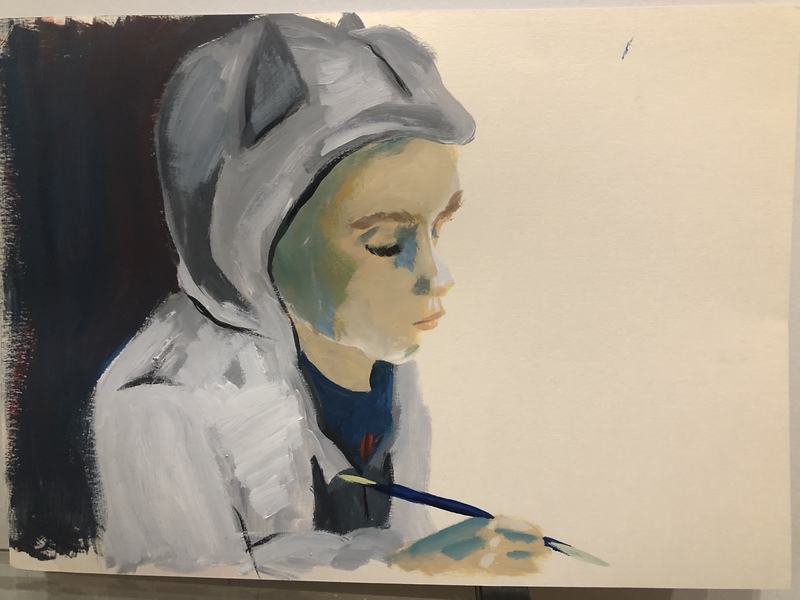 2020-04-18
2020-04-18A mother’s portrait of her prep student deep in concentration during homeschool art class.
This portrait of my son was the first time I have painted since my child was born. Although our household is busier than ever, I was inspired by my son’s love of art. We will look back on our time together at home as a special time. -
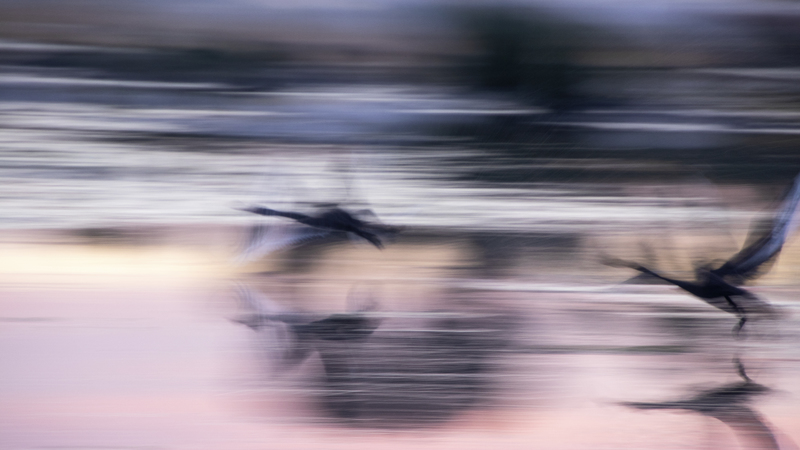 2020-03-28
2020-03-28Morning flight: Surreal times
Walking by oneself in the dawn light I cannot but wish we too could fly away from the surreal nature of this virus. A tiny speck of life, unable to be seen, has felled the economies of the world and the hubris of mankind in the space of 3 short months. My life continues pretty much as usual except only at home whilst food lasts. All my family continue to be employed - we are one of the lucky ones. I wonder if and when guilt will set in?
